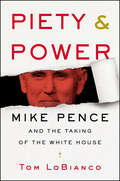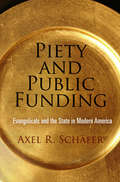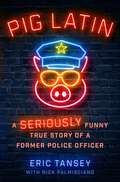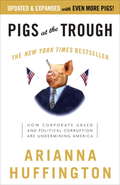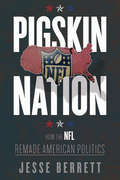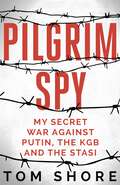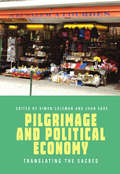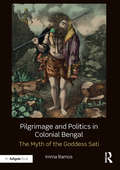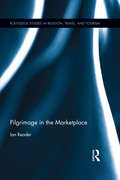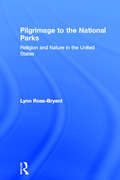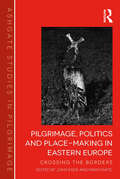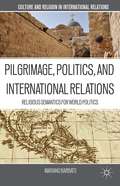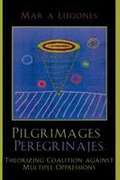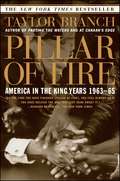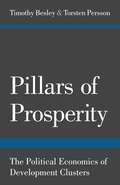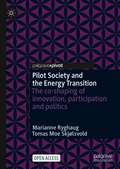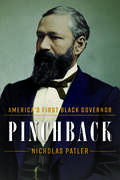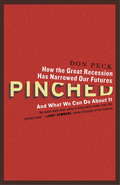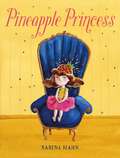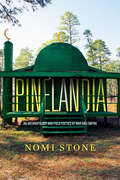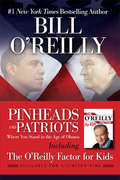- Table View
- List View
Piety & Power: Mike Pence and the Taking of the White House
by Tom LoBiancoMIKE PENCE: THE ULTIMATE POLITICAL SHAPE-SHIFTER“I’m a Christian, a conservative, and a Republican . . . in that order.” —Mike PenceAs the impeachment of President Donald Trump remains a constant topic of discussion in political circles, the questions around our current vice president also continue to swirl, and in some ways, the puzzlement over his true nature has never truly been clear. Tom LoBianco, a longtime Pence reporter, cuts to the core of the nation’s most enigmatic politician in this intimate yet expansive account of the vice president’s journey to the White House. In Piety & Power, LoBianco follows Pence from his evangelical conversion in college to his failed career as a young lawyer, to his thwarted attempts at politics until he hitched his wagon to far-right extremism, becoming the Congressional poster boy for faith-based policy and Tea Party rhetoric. Giving readers a minute-by-minute account of the selection process that made him Donald Trump’s unlikely running mate in 2016, Piety & Power traces Pence’s personal and political life, painting a picture of a man driven by faith and conviction, yes, but also a hunger for power. LoBianco crafts a revealing portrait of the real Mike Pence—a politician whose understated style masks a drive for power, but also a surprising political acumen—by drawing on years of research, over one hundred exclusive interviews with those closest to the vice president, and deep ties both within the Beltway and Indiana state politics. Highlighting Pence’s strained, at times obsequious, relationship with Trump; his marriage to Karen; his deeply repressed personality; his presidential aspirations and plans for America’s future; and his deep-rooted faith in his country, in God, and ultimately himself; Piety & Power provides insights and answers as it sheds light on this ambitious Midwestern politician, his past, and his possible future.
Piety and Politics
by Barry W. LynnThe Reverend Barry Lynn explains why the Religious Right has it all wrong. In the wake of the 2004 presidential election, the Religious Right insisted that George Bush had been handed a mandate for an ideology-based social agenda, including the passage of a “marriage amendment” to ban same-sex unions, diversion of tax money to religious groups through “faith-based initiatives,” the teaching of creationism in public schools, and restrictions on abortion. Led by an aggressive band of television preachers and extremist radio personalities, the Religious Right set its sights on demolishing the wall of separation between church and state. The Reverend Barry Lynn is a devout Christian, but this propaganda effort disturbs him deeply. He argues that politicians need to stop looking to the Bible to justify their actions and should consult another source instead: the U. S. Constitution. When the Founding Fathers of our great nation created the Constitution, they had seen firsthand the dangers of an injudicious mix of religion and government. They knew what it was like to live under the yoke of state-imposed faith. They drew up a model for the new nation that would allow absolute freedom of religion. They knew that religion, united with the raw power of government, spawns tyranny. Yet the Religious Right now seems distrustful of those principles inherent in the Constitution, viewing the separation of church and state only as a dangerous anti-Christian principle imposed upon our nation. In reality, the separation between church and state has been an important ally to religion: with the state out of the picture, hundreds of religions have grown and prospered. Religion doesn’t need the government’s assistance, any more than it is practical or appropriate for religious doctrine to be fostered in the government or taught in public schools. As an explicitly religious figure speaking out against the Religious Right, Lynn has incurred the wrath of such personalities as Pat Buchanan, Jerry Falwell, and Pat Robertson, who once said Lynn was “lower than a child molester. ” Lynn has continuously taken on these radicals of the Religious Right calmly and rationally, using their own statements and religious fervor to prove that when they attack the constitutionally mandated separation, they’re actually attacking freedom of religion. InPiety & Politics, the Reverend Barry Lynn continues the fight—educating Americans about what is at stake, explaining why it is crucial that we maintain the separation of church and state, and galvanizing us to defend the honor of our religious freedom. From the Hardcover edition.
Piety and Public Funding
by Axel R. SchaferHow is it that some conservative groups are viscerally antigovernment even while enjoying the benefits of government funding? In Piety and Public Funding historian Axel R. Schäfer offers a compelling answer to this question by chronicling how, in the first half century since World War II, conservative evangelical groups became increasingly adept at accommodating their hostility to the state with federal support.Though holding to the ideals of church-state separation, evangelicals gradually took advantage of expanded public funding opportunities for religious foreign aid, health care, education, and social welfare. This was especially the case during the Cold War, when groups such as the National Association of Evangelicals were at the forefront of battling communism at home and abroad. It was evident, too, in the Sunbelt, where the military-industrial complex grew exponentially after World War II and where the postwar right would achieve its earliest success. Contrary to evangelicals' own claims, liberal public policies were a boon for, not a threat to, their own institutions and values. The welfare state, forged during the New Deal and renewed by the Great Society, hastened--not hindered--the ascendancy of a conservative political movement that would, in turn, use its resurgence as leverage against the very system that helped create it.By showing that the liberal state's dependence on private and nonprofit social services made it vulnerable to assaults from the right, Piety and Public Funding brings a much needed historical perspective to a hotly debated contemporary issue: the efforts of both Republican and Democratic administrations to channel federal money to "faith-based" organizations. It suggests a major reevaluation of the religious right, which grew to dominate evangelicalism by exploiting institutional ties to the state while simultaneously brandishing a message of free enterprise and moral awakening.
Pig Latin: A Seriously Funny True Story of a Former Police Officer
by Nick Palmisciano Eric TanseyFrom cop-turned-comic Eric Tansey, a hilarious and humanizing portrait of law enforcement for fans of Walk the Blue Line and You Can&’t Make This Stuff Up.Eric Tansey, a former Army scout and Special Operations military veteran, joined the police force with a ton of unrealistic expectations. The reality of the job knocked him down and changed his perspective on everything. Always a magnet for uncanny, wild situations, Tansey reveals exactly what it&’s like to deal with everyday life as a police officer—from trying to tackle naked suspects to pepper spraying yourself in the face, from dealing with an angry mob to coaxing suicidal subjects off a bridge, an uncut version of everything is included. Going behind the badge to bring the public a real understanding of the job, Pig Latin hopes to help inspire sympathy rather than condemnation and to encourage current law enforcement with the knowledge that they are not alone in their mistakes, their fear, and their experience on the job.
Pigs at the Trough: How Corporate Greed and Political Corruption are Undermining America
by Arianna HuffingtonHuffington, author of and co-host of "Left, Right & Center," public radio's popular political roundtable program, catches corporate crooks in the act of bilking the public out of trillions of dollars, painting a wickedly witty portrait of how and why the greediest are running American business and government into the ground. Going beyond the Corporate Responsibility Act, she describes further reforms Americans must demand from Washington. Annotation ©2004 Book News, Inc., Portland, OR (booknews.com)
Pigskin Nation: How the NFL Remade American Politics (Sport and Society)
by Jesse BerrettCast as the ultimate hardhats, football players of the 1960s seemed to personify a crewcut traditional manhood that channeled the Puritan work ethic. <P><P>Yet, despite a social upheaval against such virtues, the National Football League won over all of America—and became a cultural force that recast politics in its own smashmouth image. <P><P>Jesse Berrett explores pro football's new place in the zeitgeist of the 1960s and 1970s. The NFL's brilliant harnessing of the sports-media complex, combined with a nimble curation of its official line, brought different visions of the same game to both Main Street and the ivory tower. <P>Politicians, meanwhile, spouted gridiron jargon as their handlers co-opted the NFL's gift for spectacle and mythmaking to shape a potent new politics that in essence became pro football. <P> Governing, entertainment, news, elections, celebrity—all put aside old loyalties to pursue the mass audience captured by the NFL's alchemy of presentation, television, and high-stepping style. <P>An invigorating appraisal of a dynamic era, Pigskin Nation reveals how pro football created the template for a future that became our present.
Pilgrim Spy: My secret war against Putin, the KGB and the Stasi
by Tom ShoreThis is one of the great untold stories of the twentieth century.It is a first-hand account of a mission by an SAS soldier sent behind the Iron Curtain by MI6 to find someone who didn't necessarily want to be found and how, on a follow-up mission, he found himself manoeuvring against a mysterious KGB officer - one Major Vladimir Putin and a murder plot by Kremlin hardliners. If the plot had succeeded, it would have given the Russians the excuse they were looking for to roll out the tanks across East Germany, the Berlin Wall would not have fallen - and the map of Europe would look very different today.It tells of roof top chases, the interrogation of terrorists to gain vital information, a beautiful, East German female (who he suspected of being a Stasi spy), betrayal by people he trusted, an escape through forests pursued by enemy agents and ending in a climactic gun battle at Colditz castle, formerly used by the Soviets as a psychiatric hospital to detain dissidents.In James Bond novels, it is MI6 operators who carry out this type of work, but in reality, when facing a committed foe in an isolated and deadly environment, the intelligence agencies call upon members of the British Special Forces. This is the first insider account of how UK operators working undercover, do what needs to be done in order to protect the UK's interests abroad - revealing their hidden hand in world events.
Pilgrimage and Political Economy: Translating the Sacred
by Simon Coleman John EadePilgrimage has always had a tendency to follow—and sometimes create—trade routes. This volume explores how wider factors behind transnational and global mobility have impacted on pilgrimage activity across the world, and examines the ways in which pilgrimage relates to migration, diaspora, and political cooperation or conflict across nation-states. Furthermore, it brings together case studies that explore forms of mobility where pilgrimage is juxtaposed, complements, or is in intimate association with other forms of movement.
Pilgrimage and Politics in Colonial Bengal: The Myth of the Goddess Sati
by Imma RamosFrom the late nineteenth century onwards the concept of Mother India assumed political significance in colonial Bengal. Reacting against British rule, Bengali writers and artists gendered the nation in literature and visual culture in order to inspire patriotism amongst the indigenous population. This book will examine the process by which the Hindu goddess Sati rose to sudden prominence as a personification of the subcontinent and an icon of heroic self-sacrifice. According to a myth of cosmic dismemberment, Sati’s body parts were scattered across South Asia and enshrined as Shakti Pithas, or Seats of Power. These sacred sites were re-imagined as the fragmented body of the motherland in crisis that could provide the basis for an emergent territorial consciousness. The most potent sites were located in eastern India, Kalighat and Tarapith in Bengal, and Kamakhya in Assam. By examining Bengali and colonial responses to these temples and the ritual traditions associated with them, including Tantra and image worship, this book will provide the first comprehensive study of this ancient network of pilgrimage sites in an art historical and political context.
Pilgrimage in the Marketplace: Pilgrimage In The Marketplace (Routledge Studies in Pilgrimage, Religious Travel and Tourism)
by Ian ReaderThe study of pilgrimage often centres itself around miracles and spontaneous populist activities. While some of these activities and stories may play an important role in the emergence of potential pilgrimage sites and in helping create wider interest in them, this book demonstrates that the dynamics of the marketplace, including marketing and promotional activities by priests and secular interest groups, create the very consumerist markets through which pilgrimages become established and successful – and through which the ‘sacred’ as a category can be sustained. By drawing on examples from several contexts, including Japan, India, China, Vietnam, Europe, and the Muslim world, author Ian Reader evaluates how pilgrimages may be invented, shaped, and promoted by various interest groups. In so doing he draws attention to the competitive nature of the pilgrimage market, revealing that there are rivalries, borrowed ideas, and alliances with commercial and civil agencies to promote pilgrimages. The importance of consumerism is demonstrated, both in terms of consumer goods/souvenirs and pilgrimage site selection, rather than the usual depictions of consumerism as tawdry disjunctions on the ‘sacred.’ As such this book reorients studies of pilgrimage by highlighting not just the pilgrims who so often dominate the literature, but also the various other interest groups and agencies without whom pilgrimage as a phenomenon would not exist.
Pilgrimage to the National Parks: Religion and Nature in the United States (Routledge Studies in Pilgrimage, Religious Travel and Tourism)
by Lynn Ross-BryantNational Parks – ‘America’s Best Idea’ – were from the first seen as sacred sites embodying the God-given specialness of American people and American land, and from the first they were also marked as tourist attractions. The inherent tensions between these two realities ensured the parks would be stages where the country’s conflicting values would be performed and contested. As pilgrimage sites embody the values and beliefs of those who are drawn to them, so Americans could travel to these sacred places to honor, experience, and be restored by the powers that had created the American land and the American enterprise. This book explores the importance of the discourse of nature in American culture, arguing that the attributes and symbolic power that had first been associated with the ‘new world’ and then the ‘frontier’ were embodied in the National Parks. Author Ross-Bryant focuses on National Parks as pilgrimage sites around which a discourse of nature developed and argues the centrality of religion in understanding the dynamics of both the language and the ritual manifestations related to National Parks. Beyond the specific contribution to a richer analysis of the National Parks and their role in understanding nature and religion in the U.S., this volume contributes to the emerging field of ‘religion and the environment,’ larger issues in the study of religion (e.g. cultural events and the spatial element in meaning-making), and the study of non-institutional religion.
Pilgrimage, Politics and Place-Making in Eastern Europe: Crossing the Borders (Routledge Studies in Pilgrimage, Religious Travel and Tourism)
by John Eade Mario KatićSince the beginning of the anthropology of pilgrimage, scant attention has been paid to pilgrimage and pilgrim places in central, eastern and south-eastern Europe. Seeking to address such a deficit, this book brings together scholars from central, eastern and south-eastern Europe to explore the crossing of borders in terms of the relationship between pilgrimage and politics, and the role which this plays in the process of both sacred and secular place-making. With contributions from a range of established and new academics, including anthropologists, historians and ethnologists, Pilgrimage, Politics and Place-Making in Eastern Europe presents a fascinating collection of case studies and discussions of religious, political and secular pilgrimage across the region.
Pilgrimage, Politics, and International Relations
by Mariano BarbatoA standout contribution to post-secular IR theory, this book addresses issues of global politics, from cooperation to conflict, and shows how a religious metaphor, the pilgrim, can help us to rethink our concepts of self, agency, and community in a time of changing world order.
Pilgrimages/Peregrinajes: Theorizing Coalition Against Multiple Oppressions (Feminist Constructions Series)
by María LugonesThe author has collected some of her most famous essays, as well as some lesser-known gems, in this book. She writes from her own perspective as an inhabitant of a number of different 'worlds.' Born in Argentina but living for a number of years in the United States, she sees herself as neither quite a U.S. citizen, nor quite an Argentine. An activist against the oppression of Latino/a people by the dominant U.S. culture, she is also an academic participating in the privileges of that culture. A lesbian, she experiences homophobia in both Anglo and Latino world. A woman, she moves uneasily in the world of patriarchy. She writes out of multiple and conflicting subjectivities that shape her sense of who she is, resisting the demand for a unified self in light of her necessary ambiguities. The book explores the possibility of deep coalition with other women of color, based on 'multiple understandings of oppressions and resistances'―understandings whose logic she subjects to philosophical investigation.
Pill City: How Two Honor Roll Students Foiled the Feds and Built a Drug Empire
by Kevin DeutschIn 2015, Baltimore plunged into the worst American riots in recent history. In the chaos, two high school honor-roll students, “Brick” and “Wax, used their smarts, computer skills, ambition and gang connections to change the world of illegal drugs forever. With their gang associates, they looted pharmacies and robbed dealers, stealing over one million doses of prescription narcotics and heroin with a street value of more than $100 million.“Brick” and “Wax” were not going to sell drugs on corners; they used location-based technology and encrypted messaging software to dispatch ordered drugs via delivery drivers—an Uber-like service that eliminated street deals and easily tapped phones. They were soon supplying cities along the East Coast, creating a whole new class of opioid addicts with the FBI and DEA trailing in their wake. To ensure their supply of drugs did not run out, the teens formed an alliance with members of the Sinaloa cartel, headed by El Chapo.Veteran Newsday crime reporter Kevin Deutsch has been reporting on the ground in drug-ravaged neighborhoods for over a year. He’s seen the bodies. Across America, thousands are dying from opioid overdoses. This middle-class crisis has been well documented, but the inner cities, where families are being swallowed up by addiction, have been ignored. Deutsch brings us into this underworld, where social unrest and cutting-edge technology allow criminals to seed the next wave of dysfunction and despair.
Pillar of Fire: America in the King Years 1963-65
by Taylor BranchFrom Pulitzer Prize-winning author Taylor Branch, the second part of his epic trilogy on the American Civil Rights Movement.In the second volume of his three-part history, a monumental trilogy that began with Parting the Waters, winner of the Pulitzer Prize and the National Book Critics Circle Award, Taylor Branch portrays the Civil Rights Movement at its zenith, recounting the climactic struggles as they commanded the national stage.
Pillar of Fire: America in the King Years, 1963-65
by Taylor BranchIn the second volume of his three-part history, a monumental trilogy that began with Parting the Waters, winner of the Pulitzer Prize and the National Book Critics Circle Award, Taylor Branch portrays the Civil Rights Movement at its zenith, recounting the climactic struggles as they commanded the national stage.
Pillars of Justice: Lawyers and the Liberal Tradition
by Owen FissThe constitutional theorist Owen Fiss explores the purpose and possibilities of life in the law through a moving account of thirteen lawyers who shaped the legal world during the past half century. He tries to identify the unique qualities of mind and character that made these individuals so important to the institutions and principles they served.
Pillars of Prosperity: The Political Economics of Development Clusters (The Yrjö Jahnsson Lectures)
by Torsten Persson Timothy BesleyHow nations can promote peace, prosperity, and stability through cohesive political institutions"Little else is required to carry a state to the highest degree of opulence from the lowest barbarism, but peace, easy taxes, and a tolerable administration of justice; all the rest being brought about by the natural course of things." So wrote Adam Smith a quarter of a millennium ago. Using the tools of modern political economics and combining economic theory with a bird's-eye view of the data, this book reinterprets Smith's pillars of prosperity to explain the existence of development clusters—places that tend to combine effective state institutions, the absence of political violence, and high per-capita incomes.To achieve peace, the authors stress the avoidance of repressive government and civil conflict. Easy taxes, they argue, refers not to low taxes, but a tax system with widespread compliance that collects taxes at a reasonable cost from a broad base, like income. And a tolerable administration of justice is about legal infrastructure that can support the enforcement of contracts and property rights in line with the rule of law. The authors show that countries tend to enjoy all three pillars of prosperity when they have evolved cohesive political institutions that promote common interests, guaranteeing the provision of public goods. In line with much historical research, international conflict has also been an important force behind effective states by fostering common interests. The absence of common interests and/or cohesive political institutions can explain the existence of very different development clusters in fragile states that are plagued by poverty, violence, and weak state capacity.
Pilot Society and the Energy Transition: The co-shaping of innovation, participation and politics
by Marianne Ryghaug Tomas Moe SkjølsvoldThis open access book examines the role of pilot and demonstration projects as crucial devices for conducting innovation in the context of the energy transition. Bridging literature from sustainability transitions and Science and Technology Studies (STS), it argues that such projects play a crucial role, not only in shaping future energy and mobility systems, but in transforming societies more broadly. Pilot projects constitute socio-technical configurations where imagined future realities are materialized. With this as a backdrop, the book explores pilot projects as political entities, focusing on questions of how they gain their legitimacy, which resources are mobilized in their production, and how they can serve as sites of public participation and the production of energy citizenship. The book argues that such projects too often have a narrow technology focus, and that this is a missed opportunity. The book concludes by critically discussing the potential roles of research and innovation policy in transforming how such projects are configured and conducted.
Pinchback: America’s First Black Governor
by Nicholas PatlerBorn to a formerly enslaved mother and a white planter father, P. B. S. Pinchback (1837–1921) became the first African American governor in the United States. His tenure as governor of Louisiana was brief—a mere thirty-five days—but he remains one of the most prominent African American officeholders during the Reconstruction era. Yet despite being a pivotal figure in the post-Civil War South, attempts to tell his story have been incomplete. From the deep influence of a mother who had spent half of her life in bondage, to the ambiguity of racial identity in Pinchback’s life and world, to a political career that was as tumultuous and rich as any in American history, the life and career of Pinchback are far more interesting and complex than most historians have portrayed. This volume presents Pinchback’s story more fully and accurately, exploring the larger and more nuanced account of how Pinchback used strategy and skill to overcome obstacles, maintain power, and push an agenda of rights and equality during the Reconstruction era, often in the face of great adversity. Pinchback worked feverishly to help create and nurture a democratized environment that made African Americans and Creoles the political and even social equals of white Louisianans. This was a sweeping change that only a few years earlier most people could have hardly dreamed possible. In every sense of the word, it was a revolution that reconfigured the political and social landscape and transformed life as everyone had once known it.
Pinched
by Don PeckThe Great Recession is not done with us yet. While the most acute part of the economic crisis is past, the recession's most significant impact on American life still lies in the future. The personal, social, and cultural changes that result from severe economic shocks build and manifest themselves only slowly. But history shows us that, ultimately, shocks this severe profoundly alter the character of society. Don Peck's Pinched, a fascinating and harrowing exploration of our dramatic economic climate, keenly observes how the recession has changed the places we live, the work we do, and even who we are--and details the transformations that are yet to come. Every class and every generation will be affected: newly minted college graduates, blue-collar men, affluent professionals, exurban families, elite financiers, inner city youth, middle-class retirees. This was not an ordinary recession, and ordinary responses will not fully end it. The crash has shifted the course of the economy. In its aftermath, the middle class is shrinking faster, wealth is becoming more concentrated, twenty-somethings are sinking, and working-class families and communities are changing in unsavory ways. We sit today between two eras, buffeted, anxious, and uncertain of the future. Through vivid reporting and lucid argument, Peck helps us make sense of how our society has changed, and why so many people are still struggling. The answers to these questions reveal a new way forward for America. The country has endured periods like this one before, and has emerged all the stronger from them; adaptation and reinvention have been perhaps the nation's best and most enduring traits. The time is ripe for another such reinvention. Pinched lays out the principles and public actions that can help us pull it off. From the Hardcover edition.
Pineapple Princess
by Sabina HahnA sly, hilarious, and bold picture book from debut creator Sabina Hahn about a fierce little girl who commandeers a rotting pineapple for a royal crown—perfect for fans of Eloise and Olivia.This misunderstood little girl is certain she’s a princess—despite the protests of her family. One afternoon she’s struck by a brilliant idea. Princesses wear crowns and she knows exactly where to get one.She gets to work—decimating her midday snack until she has a pineapple headpiece fit for royalty. Is she sticky? Yes. Does her tummy feel funny? Yes. Is she very important? Absolutely.What follows is a power rush of epic proportions and a horde of eager subjects in the form of flies. Unfortunately, her new subjects take direction. . . poorly. As this princess’s kingdom slowly devolves into chaos, both her rule and her pineapple crown begin to fall apart.Pineapple Princess is a laugh-out-loud funny debut, perfect for every intrepid, young megalomaniac in the making.
Pinelandia: An Anthropology and Field Poetics of War and Empire (Atelier: Ethnographic Inquiry in the Twenty-First Century #8)
by Nomi StoneAcross the pine forests and deserts of America, there are mock Middle Eastern villages, mostly hidden from public view. Containing mosques, restaurants, street signs, graffiti in Arabic, and Iraqi role-players, these villages serve as military training sites for cultural literacy and special operations, both seen as crucial to victory in the Global War on Terror. In her gripping and highly original ethnography, anthropologist Nomi Stone explores US military predeployment training exercises and the lifeworlds of the Iraqi role-players employed within the mock villages, as they act out to mourn, bargain, and die like the wartime adversary or ally. Spanning fieldwork across the United States and Jordan, Pinelandia traces the devastating consequences of a military project that seeks to turn human beings into wartime technologies recruited to translate, mediate, and collaborate. Theorizing and enacting a field poetics, this work enlarges the ethnographic project into new cross-disciplinary worlds. Pinelandia is a political phenomenology of American empire and Iraq in the twenty-first century.
Pinheads and Patriots Plus The O'Reilly Factor for Kids
by Bill O'ReillyWhen Bill O'Reilly interviewed then-Senator Barack Obama during the 2008 presidential elections, the two had a lively debate about the nation's future. Since that time, America has changed rapidly-some would even say seismically. And many believe these shifts are doing more than just rocking the political and social climate; they're rocking the American core. What are these changes? Who, in addition to Obama, have been the biggest forces behind them? What exactly do they mean for you, the everyday American citizen? And how are they affecting your money, health, safety, freedom, and standing in this nation? In his latest spirited book, O'Reilly prompts debate with the President and the American people on the current state of the union. Available free with your purchase of this book, for a limited time only, is another of Bill O'Reilly's bestselling books, The O'Reilly Factor for Kids-because learning to distinguish between pinheaded and patriotic behavior is important at every age!
